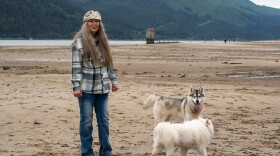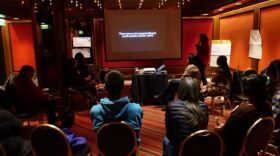-
Heather Preece, the founder of Kodiak KINDNESS, says what families takeaway from the nearly 20-year-old organization, "is the main thing about Kindness is that we were there for them," she said.
-
The class action lawsuit alleges the state has placed foster kids at risk and seeks system-wide reforms.
-
Despite lawsuits, court orders and a hiring push, Alaska's Division of Public Assistance is still struggling to keep up with applications.
-
Largely self-taught, Keats walked in two worlds, combining traditional and Western medicine. She was born in a sod house on the Noatak River in 1907 and learned from anatomy books and from processing caribou and other animals. She began practicing medicine in her 20s and worked as a midwife, helping women deliver babies. A large part of her knowledge came from listening to older generations.
-
“It's for promoting local foods and living off the land, trying to encourage younger people and everybody just to go out and harvest and eat healthier,” Tessier said.
-
The study, published in July, was the first nationwide look at the disease's rates by region. It found that over 10% of Northwest Arctic residents over the age of 65 have Alzheimer’s.
-
This weekend kicks off the Qaġruq Whaling Festival in Point Hope. Every year, people come from around the region for a three-day feast to celebrate the annual subsistence haul of the whaling season.
-
Like many Iñupiaq people in the Northwest Arctic, Harris grew up eating traditional foods such as seal oil, caribou and musk ox. When his relatives moved into Maniilaq Health Center’s elder care facility, Utuqqanaat Inaat, he found they weren’t able to eat the same food they’d lived off for years.
-
DEC officials say one potential area of risk is the Kobuk River, which is about 160 feet away from the extent of the spill.
-
With a focus on community wellness and removing stigma for the controversial topic, an Alaska nonprofit is hosting a series of listening circles in Kotzebue aimed at younger community members.
Play Live Radio
Next Up:
0:00
0:00
Available On Air Stations










